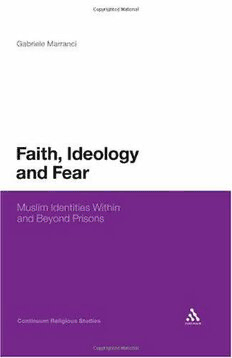
Faith, Ideology and Fear: Muslim Identities Within and Beyond Prisons PDF
190 Pages·2009·0.515 MB·English
Most books are stored in the elastic cloud where traffic is expensive. For this reason, we have a limit on daily download.
Preview Faith, Ideology and Fear: Muslim Identities Within and Beyond Prisons
Description:
Based on four years anthropological research within prisons and Muslim communities in the UK, this book offers a unique discussion of the relationship between the experience of prison among Muslims and the formation of religious identity. Gabriele Marranci thoroughly examines Muslim religious life in prison, the work of Muslim chaplains and imams (and the overall impact that they have on Muslim prisoners), providing an analysis of the current prison policies aiming to prevent radicalisation, and discusses the counterproductive results of an increasing young Muslim presence in prisons, as well as the reaction of the Muslim communities to this increase. Marranci suggests that the prison environment, and increasing restrictions therein, are linked to the fear of radicalization, and are facilitating identity processes in which Islam turns into an ideology. This important study goes on to make a thorough examination of the lives of former Muslim prisoners, showing how they are particularly vulnerable to extremists’ recruitment, and explaining the dynamics which have led, in certain cases, to their recommitting offences, or embarking on a path of radicalization.
See more
The list of books you might like
Most books are stored in the elastic cloud where traffic is expensive. For this reason, we have a limit on daily download.
